Military Museum of the Chinese People's Revolution
The Military Museum of the Chinese People's Revolution or China People's Revolution Military Museum (Chinese: 中国人民革命军事博物馆; pinyin: Zhōngguó rénmín gémìng jūnshì bówùguǎn) is a museum located in Haidian District, Beijing, China that displays restored military equipment from the history of the People's Liberation Army, up to and including modern-day machinery.
中国人民革命军事博物馆 | |
 Main entrance of Military Museum of the Chinese People's Revolution | |
| Location | Beijing, China |
|---|---|
| Coordinates | 39°54′27.61″N 116°19′03.80″E |
| Website | eng |

History

The museum was one of the Ten Great Buildings erected in celebration of the tenth anniversary of the founding of the People's Republic of China, construction of the museum began in October 1958 and ended in 1960, when it was inaugurated.
The museum was comprehensively reconstructed in 2012-2017 and reopened with a larger central hall that hosts a display of aircraft and missiles. The reconstruction allowed for a considerable expansion of the exhibition surface, from 60,000[1] to 159,000 square meters.[2]
Collections
The museum's four floors include ten halls, the largest of which is the Hall of Weapons. The Hall's extensive holdings of antiquated weaponry showcase domestic and foreign weapons, including blades, small arms, artillery, tanks, armored personnel carriers, anti-air weaponry, jet fighters, rockets and rocket launchers, and cruise missiles. Foreign weapons include Soviet tanks purchased or donated during the 1950s and 1960s, Japanese weaponry captured during the Second Sino-Japanese War, American weaponry captured from the Kuomintang during the Chinese Civil War and from UN forces during the Korean War. In addition, the Hall of Weapons displays equipment from China's space program, such as satellites and a two-seat orbital capsule.
With two exceptions, the other halls are largely historical exhibits, combining plaster sculptures, maps, paintings, artifacts, movies, and plaques (in Chinese, with select ones translated into English). The other nine halls include:
- The Hall of the Agrarian Revolutionary War: Confrontations between 1927 and 1937 of the Chinese Communist Party and the ruling Kuomintang
- The Hall of the War to Resist Japanese Aggression: The 1937-1947 Second Sino-Japanese War
- The Hall of the War of Liberation of China: The 1945-1949 period of the Chinese Civil War
- The Hall of Ancient Wars: Internal and external wars during the 4,000 years before the Qing dynasty
- The Hall of Modern Wars: Internal and external wars between 1940 and 1949
- The Hall of National Defense and Army Building: Modern military achievements and developments since 1949
- The Hall of the War to Resist US Aggression and Aid Korea: Chinese involvement in the Korean War
- The Hall of Presents: Gifts to the Chinese military or state by foreign militaries or states
- The Hall of Cheng Yunxian's Sculptural Arts: Plaster reproductions of sculptures of world leaders, historical figures, Chinese Communist Party leaders and scientists by Cheng Yunxian
Gallery
.jpg.webp) Flag of the US 31st Infantry Regiment and UN insignia, captured during the Korean War.
Flag of the US 31st Infantry Regiment and UN insignia, captured during the Korean War.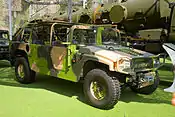 Chinese Dongfeng EQ2050 vehicle
Chinese Dongfeng EQ2050 vehicle Second Sino-Japanese War Machine guns
Second Sino-Japanese War Machine guns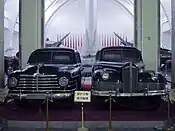 Cars of Zhu De and Mao Zedong
Cars of Zhu De and Mao Zedong Chinese first atomic bomb
Chinese first atomic bomb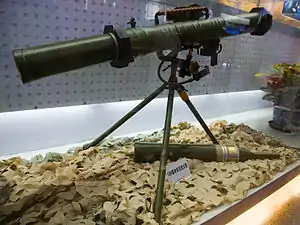 Chinese PF-98 120 mm rocket launcher
Chinese PF-98 120 mm rocket launcher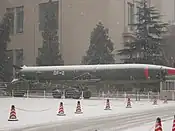 A Dongfeng 2 (CSS-1) medium-range balltistic missile
A Dongfeng 2 (CSS-1) medium-range balltistic missile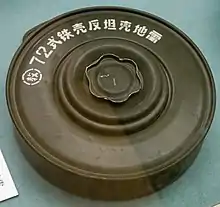 A Type 72 metallic anti-tank mine on display at the museum
A Type 72 metallic anti-tank mine on display at the museum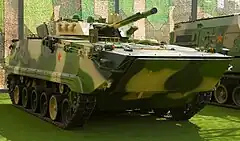 A ZBD-97 IFV vehicle
A ZBD-97 IFV vehicle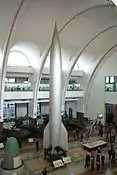 A Dongfeng 1 (SS-2) missile seen from the balcony
A Dongfeng 1 (SS-2) missile seen from the balcony A Type 95 self-propelled anti-aircraft (SPAAG) vehicle
A Type 95 self-propelled anti-aircraft (SPAAG) vehicle An American M79 grenade launcher
An American M79 grenade launcher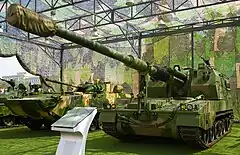 A PLZ-05 155mm self-propelled howitzer
A PLZ-05 155mm self-propelled howitzer A KS-1A mobile surface-to-air missile (SAM) launcher vehicle
A KS-1A mobile surface-to-air missile (SAM) launcher vehicle
See also
Notes
- "China People's Revolution Military Museum". china.org.cn. 2003.
- "The Military Museum of the Chinese People's Revolution". China Services Info. 30 August 2018.